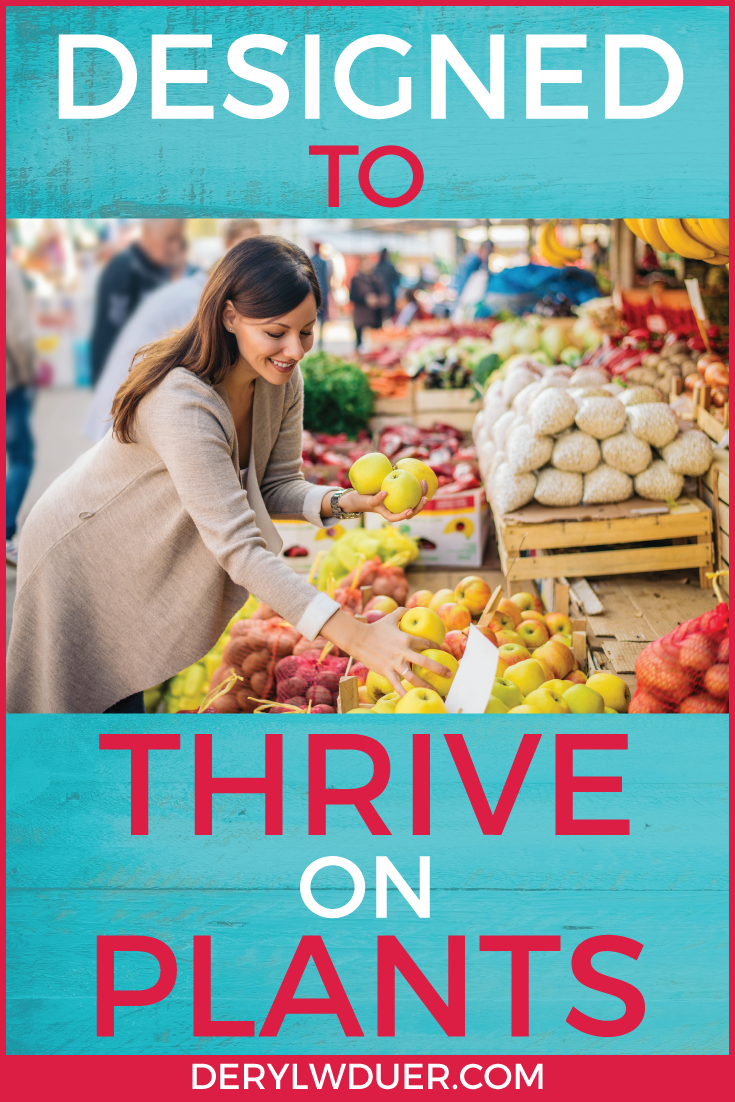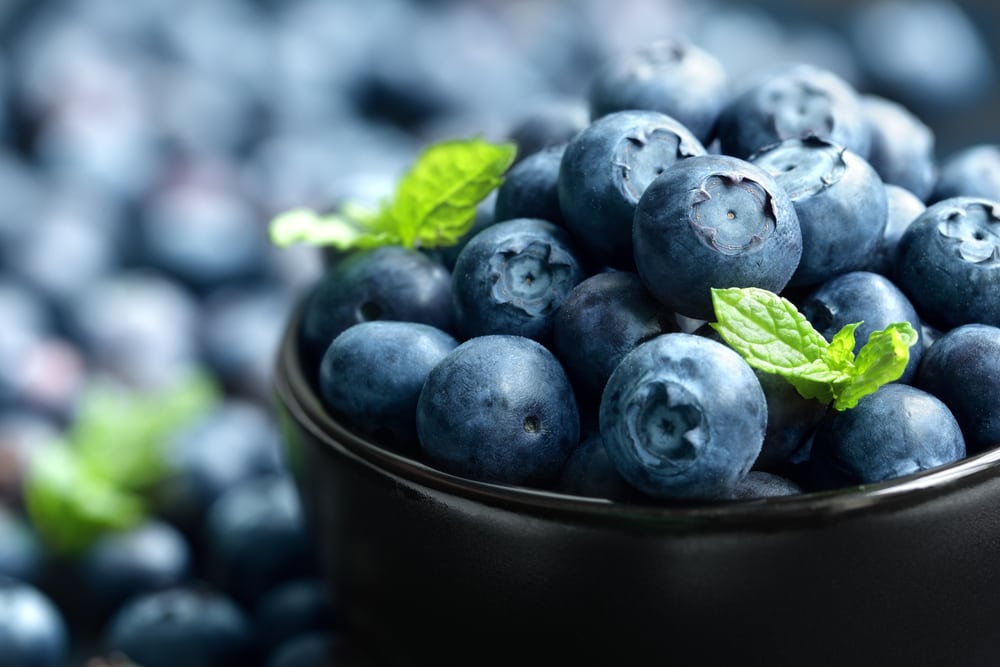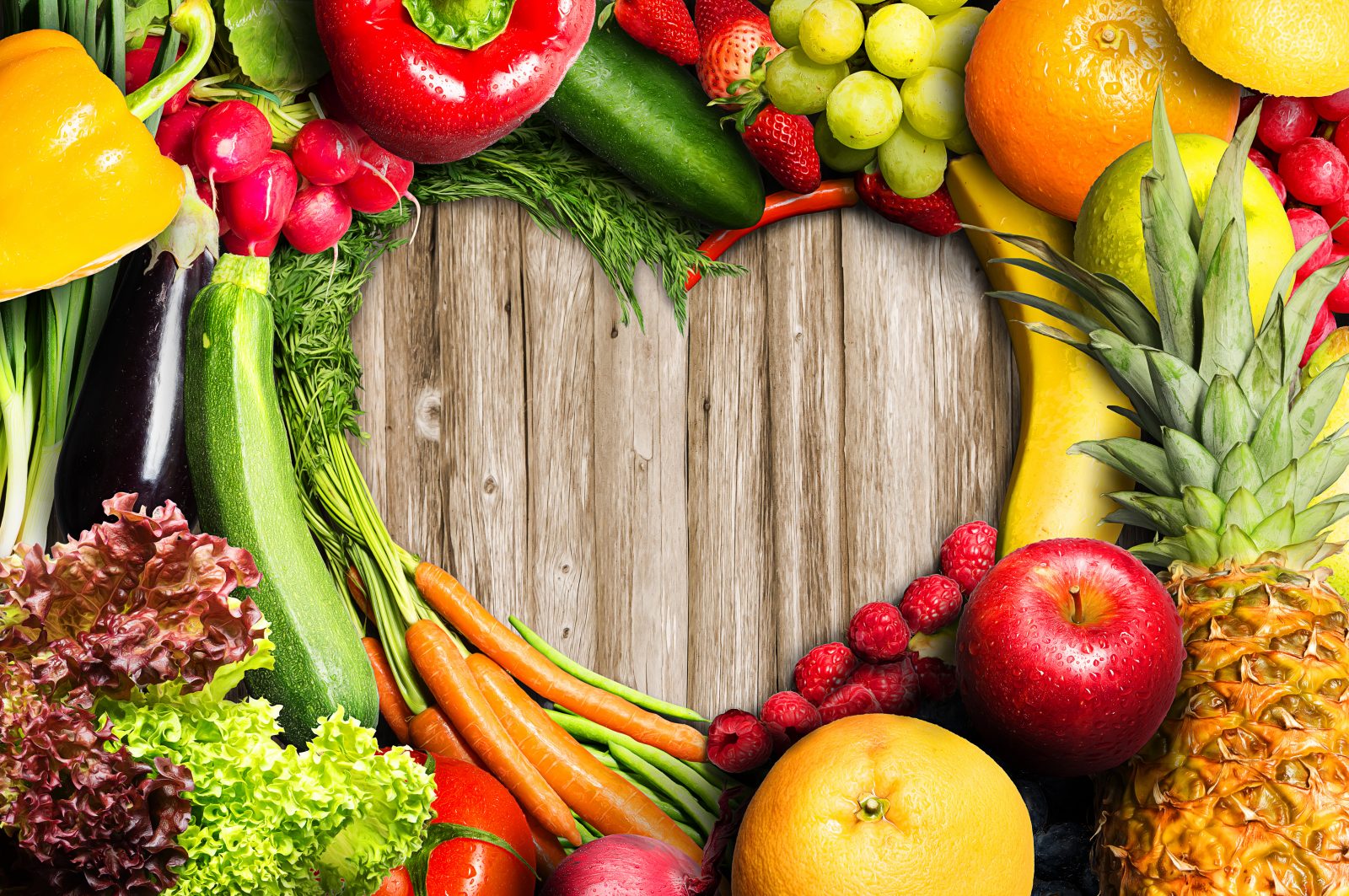Designed To Thrive on Plants

There seems to be a lot of confusion about nutrition—a subject that God intended to be very simple. We were designed to thrive on plants.
I love what author Michael Pollan said: “I realized that the answer to the supposedly incredibly complicated question of what we should eat wasn’t so complicated after all, and in fact could be boiled down to just seven words: Eat food. Not too much. Mostly plants.”
Keeping It Simple
Eat food. Not too much. Mostly plants.
That’s it in a nutshell. God’s plan to feed our bodies summed up in seven simple words.
As I said, God intended for it to be simple. Eat food, meaning real food. Real food is whole and natural. Food that once was alive and, therefore, has life in it. Food that your great-grandparents would recognize as food.
Not too much. That one’s pretty self-explanatory. Don’t overeat. Don’t be a glutton. But don’t worry—you’re much less likely to overeat when you’re eating real food. It’s the processed foods that were engineered to trick your body into overeating that are the problem. For example, have you ever seen anyone binge on apples or carrots or kale? Probably not.
Mostly plants. Again, self-explanatory. When God created Adam and Eve, the food He gave them to eat consisted entirely of plants. That’s the original design of our bodies. So even though God extended our diets beyond plants, we still tend to perform better with a primarily plant-based diet.
What about all of those other diets? Do they work? Absolutely. For some people, some of the time. However, they all work best when you eat mostly plants.
Designed To Thrive on Plants
Designed To Thrive on Plants
In The Beginning
Many diet plans attempt to answer the question of what we should eat by looking to the past—to what our earliest ancestors ate. That’s the basis of the Paleo diet, for example. But the paleolithic era is not the beginning. Genesis 1 is the beginning.
In the very first chapter of the Bible, God says, “Then God said, “Behold, I have given you every plant yielding seed that is on the surface of all the earth, and every tree which has fruit yielding seed; it shall be food for you” (Genesis 1:29).
God knew that humans would need food for nourishment. It is a gift from Him. However, the original instruction regarding what we should eat was entirely plant-based.
It would not be until after the Flood, 1656 years later, that we first see the provision for non-plant foods. After Noah and his family left the ark, God said: “Every moving thing that lives shall be food for you. And as I gave you the green plants, I give you everything” (Genesis 9:3 ESV).
We don’t know exactly why this change occurred, but one theory is that our environment had changed. The post-flood world was very different from the pre-flood world. Humanity became even more dependent on heavy labor, speed, and physical strength to survive in this new world. As a result, the proteins unique to animal-based foods may have some benefit.
Even though God now allowed the eating of flesh, He created our bodies to run most effectively on a diet consisting mostly, if not entirely, of plants.
Designed To Thrive on Plants

Designed To Thrive on Plants
William C. Roberts, editor in chief of the American Journal of Cardiology and medical director of the Baylor University Heart and Vascular Institute, here in the red-blooded state of Texas, says that humans aren’t physiologically designed to be meat eaters.
Our intestinal length, our need for vitamin C from outside sources, and our ability to sweat link us more closely to herbivores than to carnivorous mammals. “I think the evidence is pretty clear,” he says. “If you look at various characteristics of carnivores versus herbivores, it doesn’t take a genius to see where humans line up.” Our flat (rather than pointed) teeth, the carb-metabolizing enzyme amylase contained in our saliva, and the fact that we, unlike carnivores, can’t metabolize uric acid also suggest that we are better adapted to eat plants than animal foods.”
THE HEALING POWER OF PLANTS

Unlike anything else, food has the power to heal us. It is the most potent and effective medicine available with the power to prevent and heal most of the chronic illnesses that plague our society.
The link between our food and our health is absolute, and its effect is so immediate and so profound that you would think we would be more aware of what is going on in our own bodies. Still, most of us are completely clueless. We have no idea that our food choices are responsible for our health or our lack thereof.
If you want to feel better, have more energy, be less prone to illness and disease, even reverse certain diseases, it’s time to understand that all of these conditions are fueled by what we put in our bodies.
Do we really doubt that a cheeseburger and a vibrant green salad have different effects on our body? Food is more than just calories. Food instructs us.
Plants provide an excellent source of vitamins, minerals, proteins, healthy fats, and “phytochemicals,” which, by definition, are found only in plants (phyto means “plant” in Greek).
Phytochemicals contain invaluable and biologically significant substances, such as antioxidants, that many believe reduce the risk of cancer, stroke, metabolic syndrome, and other illnesses.
For example, if we want to prevent cancer, we can eat foods that contain cancer-fighting chemicals. Foods like tomatoes, grapefruit, watermelon, and guava contain a micronutrient family called carotenoids.
Carotenoids are plant pigments responsible for bright red, yellow, and orange hues in many fruits and vegetables, but they have numerous health benefits. The most common carotenoids in North American diets are α-carotene, β-carotene, β-cryptoxanthin, lutein, zeaxanthin, and lycopene. Carotenoids, and lycopene, in particular, have been shown to help keep the liver, prostate, breast, colon, and lungs healthy.[i]
Designed To Thrive on Plants

Designed To Thrive on Plants
Grapes, berries, and peanuts contain a chemical called resveratrol. Resveratrol is a powerful antioxidant that has been shown to reduce inflammation in the body. It also helps protect your cells from free radical damage. Free radicals are unstable molecules produced in the body as byproducts of cellular reactions, metabolism of foods, breathing and other vital functions.[ii] Free radicals ultimately harm and age the body over time because they damage (oxidize) DNA, cellular membranes, lipids (fats) stored within blood vessels and enzymes.[iii]
Resveratrol also helps to lower blood pressure, and inhibit the spread of cancer, especially prostate cancer. It is also unique among antioxidants because it can cross the blood-brain barrier. The blood-brain barrier is a highly selective semipermeable membrane barrier that separates the circulating blood from the brain extracellular fluid in the central nervous system (CNS).[iv] Think of it as a security system for your brain. Because resveratrol can cross this barrier, it is uniquely able to repair and protect your brain and central nervous system. It has also been shown to help prevent Alzheimer’s disease.[v]
Red grapes, citrus fruits, berries, broccoli, and leafy green vegetables all contain the flavonoid, quercetin. Tea and wine also contain quercetin. Quercetin is considered to be one of the most abundant antioxidants in the human diet and plays a vital role in fighting free radical damage, the effects of aging, and inflammation.
Designed To Thrive on Plants

Designed To Thrive on Plants
Cruciferous vegetables, such as broccoli, kale and Brussels sprouts, provide us with sulforaphane. This one is super cool because it’s a compound not actually contained in the plant. When you chew the plant, the enzyme myrosinase (found in saliva) transforms glucoraphanin (from the plant) into sulforaphane. [vi] It’s a bit complicated, I know. The main thing to remember is there is stuff in our saliva that mixes with stuff in the broccoli and they combine to make something entirely new—that something is called sulforaphane.
And that’s just the beginning. Sulforaphane activates two hundred different genes, some that protect against cancer and some that prevent cancer from spreading. It has been found to hinder the growth of breast cancer and prostate cancer cells specifically, although its benefits appear to extend to genes everywhere in the body. Sulforaphane kills cancer stem cells. It normalizes DNA methylation, a process that regulates gene expression. Sulforaphane also kills an enzyme that damages cartilage.[vii]
When I first learned about this, I marveled at the wonderful genius of our amazing God. We get a powerful, healing, cancer-fighting chemical compound from broccoli—even though it isn’t actually in broccoli, but is created and released when we chew broccoli. Talk about mind-blowing!
Of course, the catch is you have to actually eat broccoli.
SUPERFOODS

You may have heard the term “superfood,” but never really knew what that means. Superfoods are just that—super-foods. If you are looking for an easy way to feel great, lose weight and function better, start adding more superfoods to your diet.
What are superfoods? They are the most nutrient-dense foods on the planet. In a nutshell, they “are whole foods that have not been processed and go beyond basic nutrition. They are foods that contain various combinations of vitamins, minerals, or antioxidants that help prevent disease and sickness while promoting outstanding health benefits.”[viii]
So, which superfoods should you be eating? That’s a great question. Unfortunately, the answer is not so simple. According to superfood expert, Darin Olien, “First, we need to understand the proper uses of superfoods. They are a way of bridging a gap. They’re not cure-alls. They should fit in somewhere between our normal food intake and our nutritional supplements and medicines.”[ix]
What you will notice about nearly all superfood lists is that they are primarily plants. David Wolfe’s Top 10 Superfoods include the following: goji berries, cacao, maca, bee products (such as honey and royal jelly), spirulina, AFA blue-green algae, marine phytoplankton, aloe vera, hempseed, and coconuts. He also lists açai, camu camu berry, chlorella, Incan berries, kelp, noni, and yacon as “honorable mentions.”[x] Steven Pratt, a medical doctor and author of SuperFoods RX: Fourteen Foods That Will Change Your Life, lists a few more common foods: beans, blueberries, broccoli, oats, oranges, pumpkin, salmon, edamame, spinach, tea (green or black), tomatoes, turkey, walnuts, and yogurt.
THE BOTTOM LINE
I’m not suggesting that everyone needs to be vegan or vegetarian. Some people thrive on purely plant-based diets; some don’t. I don’t believe that there is any one way of eating that works universally—other than eating real food.
However, I do believe that everyone will benefit from incorporating more plants into his or her diet. I believe that most of what you eat should be plants. I agree with Michael Pollan that you will be healthier and happier when you, “Eat food. Not too much. Mostly plants.”
Eating mostly plants works with just about every “diet” out there. You can even be mostly plant-based on paleo and keto diets. There is even evidence that those diets work better when you do.
The bottom line is that your body is designed to thrive on plants.
[i] “Carotenoids,” Oregon State University, Linus Pauling Institute, Micronutrient Information Center, http://lpi.oregonstate.edu/mic/dietary-factors/phytochemicals/carotenoids
[ii] “An introduction to free radical biochemistry,” https://www.ncbi.nlm.nih.gov/pubmed/8221017
[iii] Josh Axe, “Fighting Free Radicals & Free Radical Damage,” https://draxe.com/fighting-free-radical-damage/
[iv] “Blood-brain barrier,” Wikipedia, https://en.wikipedia.org/wiki/Blood–brain_barrier
[v]. Mercola, “The Secrets of Resveratrol’s Health Benefits,”
http://articles.mercola.com/sites/articles/archive/2009/08/18/the-secrets-of-resveratrols-health-benefits.aspx
[vi]. https://en.wikipedia.org/wiki/Sulforaphane
[vii]. Olien, 13.
[viii] Stefanie Cassetto, “Enjoy Superfoods for Better Health,” The Daniel Plan, http://www.danielplan.com/healthyhabits/supperfoodoverview/
[ix] Olien, 102.
[x] Wolfe, 5, 225.










